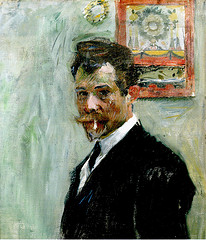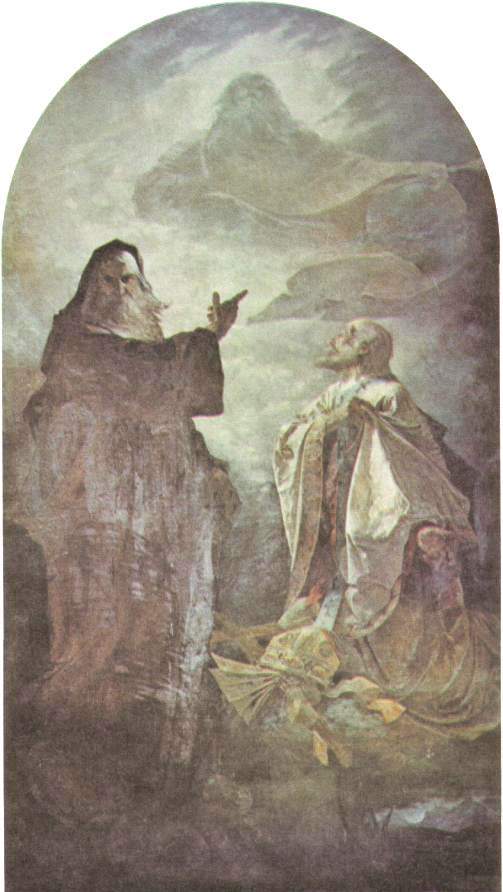|
Jan Preisler
Jan Preisler (17 February 1872, in Králův Dvůr – 27 April 1918, in Prague) was a Czech painter and art professor. Life Jan Preisler’s family worked in the local iron foundry and he attended the nearby primary schools. From an early age, he was considered to be a loner who preferred walks in the woods to playing with friends. His drawings attracted the attention of his headmaster and his parents soon received letters inviting them to send him for studies in Prague, with financial support. In 1887, at the age of fifteen, he began his studies at the School of Applied Arts, where he initially worked under František Ženíšek, but was later allowed to pursue his studies independently. After graduating, he shared a studio with Karel Špillar. During his time at the school, he had made contact with the Mánes Union of Fine Arts and became involved in its journalistic activities. In 1896, he provided the cover for the first issue of the association's magazine ''Volné Směry' ... [...More Info...] [...Related Items...] OR: [Wikipedia] [Google] [Baidu] |
Jan Preisler2
Jan, JaN or JAN may refer to: Acronyms * Jackson, Mississippi (Amtrak station), US, Amtrak station code JAN * Jackson-Evers International Airport, Mississippi, US, IATA code * Jabhat al-Nusra (JaN), a Syrian militant group * Japanese Article Number, a barcode standard compatible with EAN * Japanese Accepted Name, a Japanese nonproprietary drug name * Job Accommodation Network, US, for people with disabilities * ''Joint Army-Navy'', US standards for electronic color codes, etc. * ''Journal of Advanced Nursing'' Personal name * Jan (name), male variant of ''John'', female shortened form of ''Janet'' and ''Janice'' * Jan (Persian name), Persian word meaning 'life', 'soul', 'dear'; also used as a name * Ran (surname), romanized from Mandarin as Jan in Wade–Giles * Ján, Slovak name Other uses * January, as an abbreviation for the first month of the year in the Gregorian calendar * Jan (cards), a term in some card games when a player loses without taking any tricks or scoring a m ... [...More Info...] [...Related Items...] OR: [Wikipedia] [Google] [Baidu] |
Alfons Mucha
Alfons Maria Mucha (; 24 July 1860 – 14 July 1939), known internationally as Alphonse Mucha, was a Czech painter, illustrator and graphic artist, living in Paris during the Art Nouveau period, best known for his distinctly stylized and decorative theatrical posters, particularly those of Sarah Bernhardt. He produced illustrations, advertisements, decorative panels, as well as designs, which became among the best-known images of the period. In the second part of his career, at the age of 57, he returned to his homeland and devoted himself to a series of twenty monumental canvases known as '' The Slav Epic'', depicting the history of all the Slavic peoples of the world, which he painted between 1912 and 1926. In 1928, on the 10th anniversary of the independence of Czechoslovakia, he presented the series to the Czech nation. He considered it his most important work. Early life Mucha was born on 24 July 1860 in the small town of Ivančice in southern Moravia, then a province ... [...More Info...] [...Related Items...] OR: [Wikipedia] [Google] [Baidu] |
Academy Of Fine Arts, Prague Faculty
An academy (Attic Greek: Ἀκαδήμεια; Koine Greek Ἀκαδημία) is an institution of secondary or tertiary higher learning (and generally also research or honorary membership). The name traces back to Plato's school of philosophy, founded approximately 385 BC at Akademia, a sanctuary of Athena, the goddess of wisdom and skill, north of Athens, Greece. Etymology The word comes from the ''Academy'' in ancient Greece, which derives from the Athenian hero, ''Akademos''. Outside the city walls of Athens, the gymnasium was made famous by Plato as a center of learning. The sacred space, dedicated to the goddess of wisdom, Athena, had formerly been an olive grove, hence the expression "the groves of Academe". In these gardens, the philosopher Plato conversed with followers. Plato developed his sessions into a method of teaching philosophy and in 387 BC, established what is known today as the Old Academy. By extension, ''academia'' has come to mean the accumulation, d ... [...More Info...] [...Related Items...] OR: [Wikipedia] [Google] [Baidu] |


